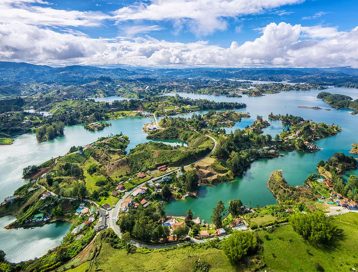LAC: Disaster Risk Management and climate change: preparing for uncertainty
Latin America and the Caribbean are exposed to multiple hazards including river and coastal floods, droughts, earthquakes and landslides. Most of these will intensify due to climate change. The World Bank Natural Disaster Hotspots study (Dilley et al. 2005) indicates that seven among the world's top 15 countries exposed to three or more hazards are located in Latin America and the Caribbean.

Coping with hazards and emergencies, governments, intergovernmental, non-governmental, and development organizations need well balanced measures of preparedness, response and recovery to reduce vulnerability, capacity building, better information, and institutional strengthening.
At Deltares we support authorities to understand and quantify vulnerabilities and risks, and develop robust and feasible coping strategies to natural disasters.
In the Dominican Republic for example, we are supporting the Ministry of Public Works and Communications to enhance the robustness of their road network and their decision making process. We provide them with tools and methodologies to help them identify the priority locations for intervention and prioritize their investments in an objective and robust manner, taking into account an uncertain future. With this, we expect they can make efficient, effective and durable use of (limited) resources to build the resilience of the road network against natural hazards.
Proactive and integrated hazard risk management including preparedness, readiness, emergency response and recovery, are part and parcel of our approach, and we play an active role in the community of the Sendai Framework for Disaster Risk Reduction.
Combining soft (non-structural) and hard (structural) measures, and making use of building with nature concepts is at the heart of the strategies we work on with our clients.
Examples of our recent work
Comparative assessment of tools for modelling drought risks (Global/ Colombia)
A data and model inventory of all relevant hydrological and remote sensing indicators, models, datasets, and tools that can be used to detect, monitor, and forecast drought risk in data scarce areas are collected in a dedicated catalogue. Within this project, a Principles and implementation guidance on assessing drought hazard and risk was also developed. Contact person: Patricia Trambauer
Evaluating Groundwater Scarcity and Abundance due to Climatic Extremes in the Cauca valley (Colombia)
In this project a regional numerical hydrogeological model of the south of the Valley is developed and included in a decision support tool. The support tool is meant for the regional authority to decide on new wells, schedule pumping schemes and decide on spatial planning to protect groundwater. Contact person: Marta Faneca
WaterLOUPE - Assessing water scarcity risks now and in the future (Colombia, Argentina)
The WaterLOUPE tool tracks data relating to social, economic and climate factors that affect fresh water availability in river basins and displays the information on a highly visual, user-friendly dashboard. The scientifically sound tool is easily accessible for all user groups and provides scenarios extending to a thirty-year time horizon. It runs the risk assessment for each actor-group separately, instead of providing one generic risk assessment per basin. Contact persons: Marta Faneca.
Long-term Planning of Water Investments in the Chancay-Lambayeque Basin, Peru using the Decision Tree Framework (Peru)
This study assessed the performance of the Chancay-Lambayeque to future climatic and demographic changes and identify robust adaptation options including new reservoirs, increased groundwater pumping and natural infrastructure. Contact person: Umit Taner.
Assessing the impact of sea level rise and adaptation potential in the Caribbean (Global, Caribbean Islands)
Revisiting Resilience in the Caribbean: a 360 degree approach (Global, Caribbean Islands) In this study, a regional estimation of the effects of sea level rise in terms of: a) coastal flooding and b) erosion of sandy beaches was carried out, with the aim of deriving proxies to estimate the resilient potential of each country of the Caribbean region and their potential to adaptation. Contact person: Alessio Giardino.



